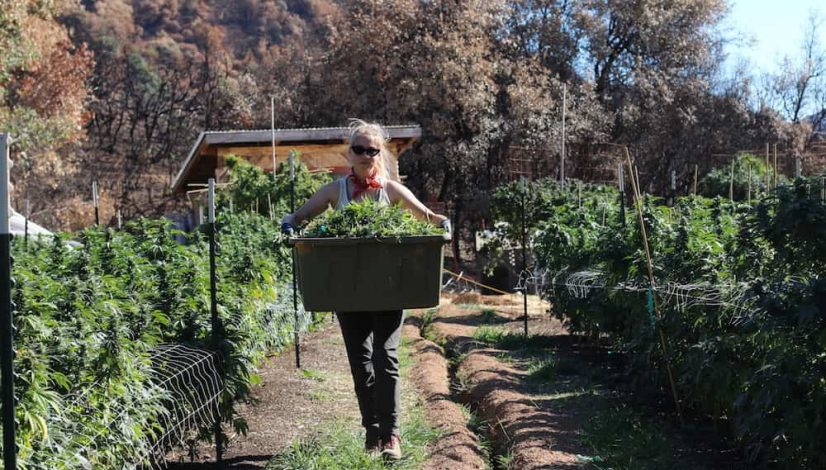How Aster Farms is Rebuilding After the Mendocino County Fire
Over the course of 2018, California has suffered both its largest and its most destructive wildfires. The Camp Fire is the state’s most destructive, burning over 142,000 acres, killing at least 85 people, and destroying more than 18,000 structures. These totals are apt to rise, as not all of the missing have been accounted for and the fire still isn’t fully contained. In July, the Mendocino County Fire—comprised of both the Ranch and smaller River fires—became California’s largest at over 458,000 acres, though it only destroyed some 280 structures.
Among them were several belonging to Aster Farms, an Upper Lake cannabis company founded in 2016 by husband-and-wife team Julia Jacobson and Samuel Ludwig on the farm where Director of Cultivation Noah Cornell had lived since 2008. Four months later, the company is just getting back on their feet; today, Jacobson describes the farm’s garden as “a little oasis of green amidst moonscape.” How does one recover from complete devastation? Jacobson and Ludwig say it’s all about gratitude, community support, and looking for the silver lining.
Jacobson and Ludwig
Both Jacobson and Ludwig had used cannabis for medicinal purposes prior to becoming entrepreneurs in the industry. Jacobson used it for insomnia and chronic migraines, while Ludwig found it provided relief for a shoulder injury that never fully healed. As California moved towards the legalization of recreational cannabis, the couple found themselves wanting to start a brand they’d like to buy: safe, sustainable, local, clean—the kind of cannabis you’d buy at Whole Foods, if Whole Foods sold cannabis. Ludwig’s childhood friend, Noah Cornell, has a degree in sustainable agriculture and had already been cultivating for over a decade. In 2016, the trio decided to use the soil Cornell had already been working on for their new venture and Aster Farms was born.
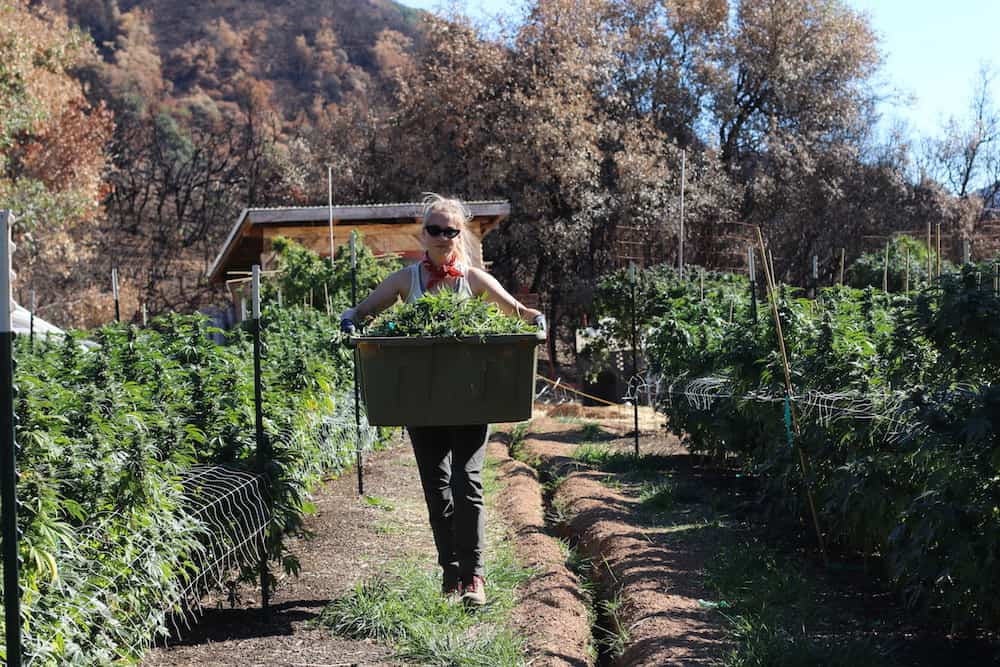
Julia Jacobson; Courtesy of Aster Farms
But on July 27, Jacobson recalled stepping outside to take a break from packaging and spotting a huge plume of smoke coming over a nearby ridge. This is the same day the fire was first reported, though they’d spend three days watching and waiting, setting up sprinklers, and preparing for a possible evacuation. Cornell and his family did not sleep in their home on the property, just in case something happened overnight. Ludwig remembered occasionally driving off the farm and down the road to see where the fire had spread.
“We were basically surrounded on all sides by these massive plumes of smoke to the north and south of us,” he said. “At one point, the plumes actually met above us and let off this very eerie, orange, apocalyptic light all over the area over our property and probably beyond. It wasn’t just about seeing the fire, but also seeing all the firemen, firetrucks, and planes dropping retardant all around us. It felt very ominous.”
The Aster team had hoped, on the second day, that the planes soaring overhead might be the farm’s salvation. Yet they seemed to pass the farm by without dropping water or fire retardant.
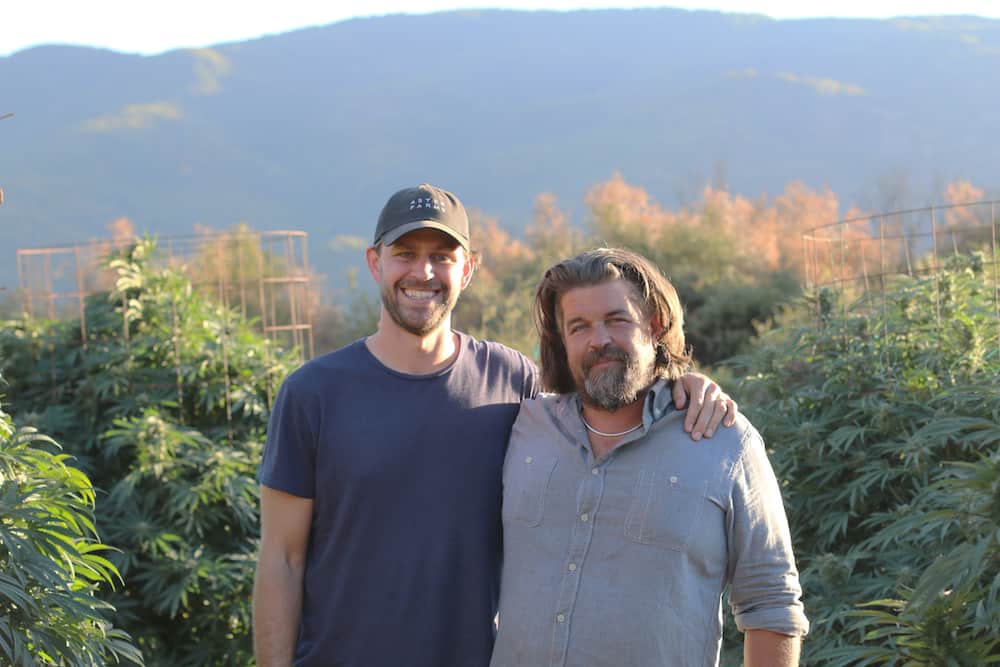
Samuel Ludwig and Noah Cornell; Courtesy of Aster Farms
“It was pretty tough to stomach,” Jacobson said. “When we saw the planes coming, we were shouting and cheering and high-fiving. I think I even called my mom and said, ‘they’re here, it’s going to be over.’ And they didn’t drop and just went away.”
Likely complicating matters was the Carr Fire, threatening the city of Redding. The Aster team understood that the more populated area may have been prioritized over their location, which remains largely rural. By comparison, the Carr Fire is now ranked as the seventh most destructive fire in California history.
The Evacuation
When winds again shifted the fire in Aster Farms’ direction, the team began taking photos for insurance purposes, gathering the rest of their belongings, and rounding up their animals. They were easily able to ready their two dogs and were grateful that two of their farm cats wandered into the garage as they were packing up. But, they couldn’t find Harry, a friendly half-bobcat, half-tabby that had lived on the property with the Cornells for several years.
“He was roaming around and not anywhere we could catch him when we were evacuating,” Jacobson said. “That was horrible, searching desperately for an animal that you love, knowing that you have to leave them.”
Yet as Harry remained missing, another animal appeared: a stray Yorkshire Terrier covered in matted fur they called Flash, as they typically only saw the tiny dog darting among bushes and trees. In the weeks leading up to the fire, they’d begun to see her more often and one farm employee had even been able to get Flash to eat food from her hand.

Flash; Courtesy of Aster Farms
“She was just standing there in front of us. We were positive she knew something was wrong. I reached down, and she just looked up and knew she had to be saved,” Jacobson said.
So, Flash accompanied the group out of the area and to safety. Their escape was not a harrowing one, like the panicked tales that have since come out of Paradise, CA. Aster Farms had something many in the Camp Fire did not: time to prepare.
Once they’d made it out, it was a long wait to find out what, if anything, was left. For over a week, mandatory evacuations prevented the team from returning.
“When you’re locked out for 10 days, all you have are the satellite images,” Jacobson said. “It was really tough, just wondering what happened.”
The Aftermath
When they finally returned, the devastation was shocking. The Cornell family’s home was gone, as were Aster Farms’ office and their large garden and its some 500 plants. A smaller garden of 100 plants yielded just 13 that had survived completely, but the others died over the course of those 10 days as damaged irrigation lines prevented them from getting any water. While one of their popular strains, Maui OG, survived, their Sour Maui did not. Other surviving structures included a shed and some fencing. Jacobson was relieved that they had yet to start construction on a planned buildout of their processing facility and new greenhouses, as those might have been lost, too.
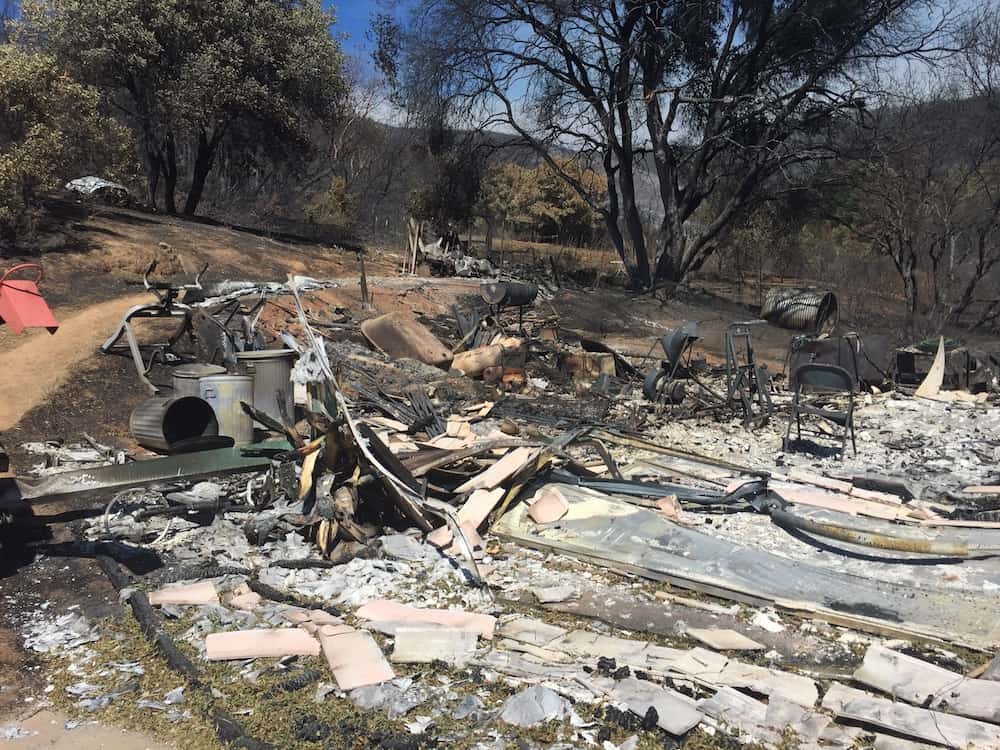
Courtesy of Aster Farms
There was no time to dwell on what had happened. Jacobson said they immediately began clearing out dead plants and tilling the soil. Neighbors helped them hang flyers and set up traps and cameras in search of Harry, whom they hoped had been able to flee. The cannabis community rallied around Aster; Top Hat Nursery in Salinas donated 400 cannabis plants, while Terra Vesco in Sonoma offered them compost and fertilizer. Aster’s distributors, Nabis and Siligreen, graciously waived transportation costs when bringing the donated plants and planting material to the property.
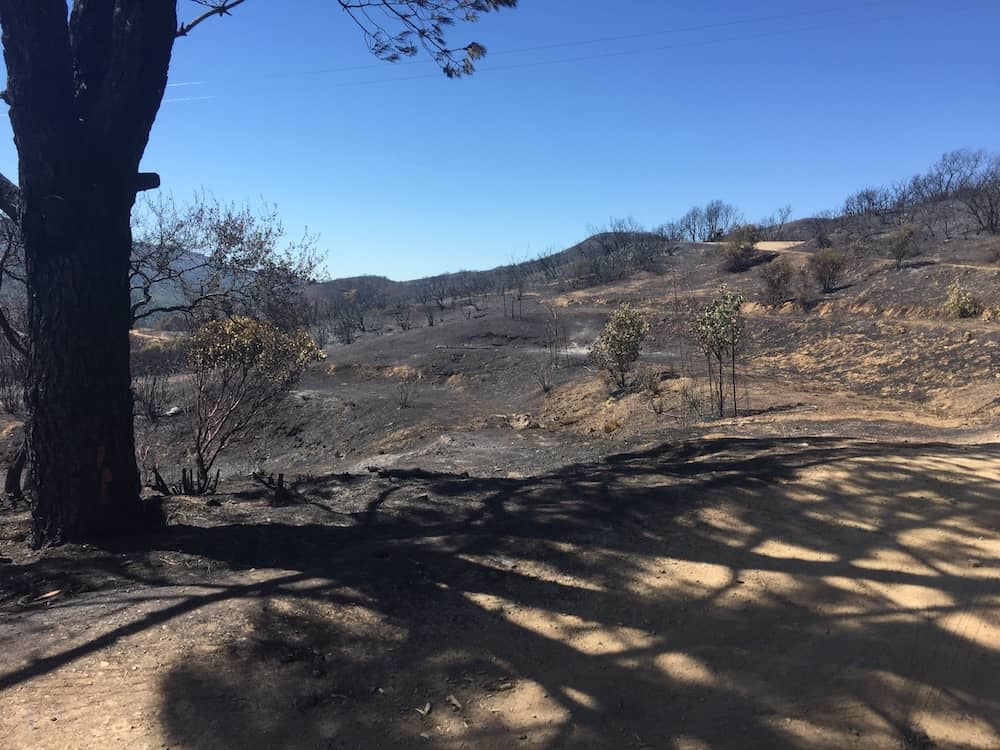
Courtesy of Aster Farms
Aster is now making strides towards a fresh future. A new greenhouse, which they hope will be up and running in the next few months, will feature a light-deprivation cycle of both Sour Maui and Maui OG. Flash has since been checked out by a veterinarian and cleaned up by a groomer. She’s now a part of the Aster family and “lives for pets,” according to Jacobson.
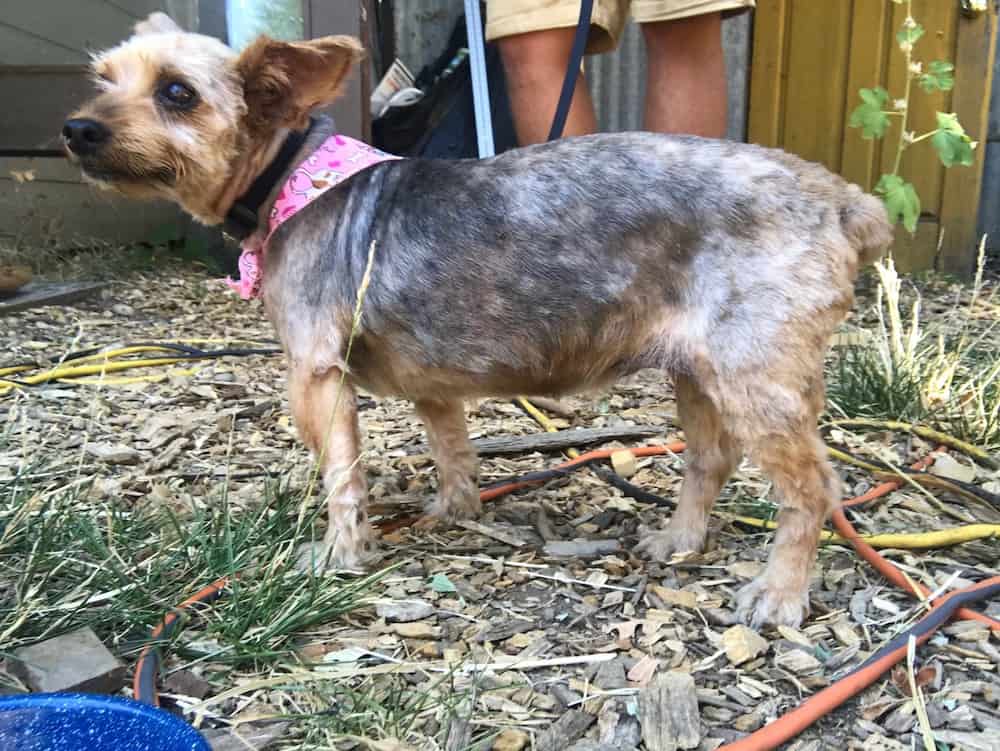
Flash today; Courtesy of Aster Farms
Moving Forward
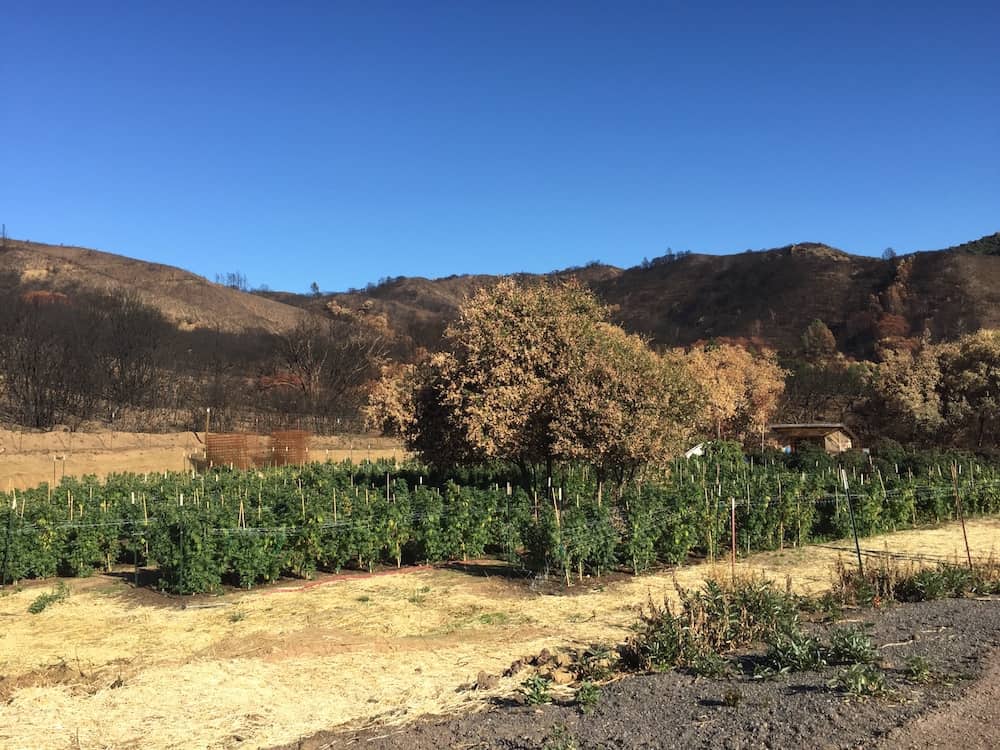
Green again; Courtesy of Aster Farm
Though they don’t expect another wildfire to hit the area for at least another 15 to 20 years, making the farm fire defensible has become a large priority. Precautions include clearing out at least 30 feet of defensible space around the farm, meaning clearing the brush and trees so that if a fire does come, it has no fuel to spread further. They’ve also acquired an additional water tank and as they rebuild structures, will consider fire-defensible materials and building at an angle that will work with the surrounding ridge patterns so that flames will go up and over instead of straight through.
There’s a part of the process, however, that isn’t about structures built, angles considered, or plants in the freshly tilled soil. Some of it is emotional; how does one lose so much, but maintain the will to move forward?
“What’s really helped move forward are the silver linings,” Jacobson said. “And the biggest one is that we get to rebuild the farm of our dreams. That doesn’t just mean the Aster Farms cultivation, but [Cornell’s] house as well.”
She continues, “It takes a long time. I’ll say that. But every day, we just look at these silver lining and we are so thankful that we had time to escape…We were incredibly unlucky the with the largest wildfire in California history, only 200 structures burned and we were one of them, but the support from the community has really allowed us to get back on our feet quickly.”

Harry’s Harvest; Courtesy of Aster Farms
As a thanks to the community, Aster Farms has released a new product line called Harry’s Harvest, named in honor of Harry the cat. From each 5-pack of joints, rolled with a combination of the farm’s flower, $2 will be donated to the Hopland and Lakeport volunteer firehouses. In the future, Jacobson said they hope to donate to nonprofits that work with the opioid crisis and veterans. Those who are in areas where Harry’s Harvest is not currently available may donate to Aster Farms’ Crowdrise to support these causes.
As for Harry himself, he remains missing. Ludwig said he hopes that the cat ran in a different direction and found safety at a nearby water source.
“Hopefully, he’s far away and living an amazing bobcat life and maybe one day, he will find his way home,” Jacobson said.
The post How Aster Farms is Rebuilding After the Mendocino County Fire appeared first on High Times.

